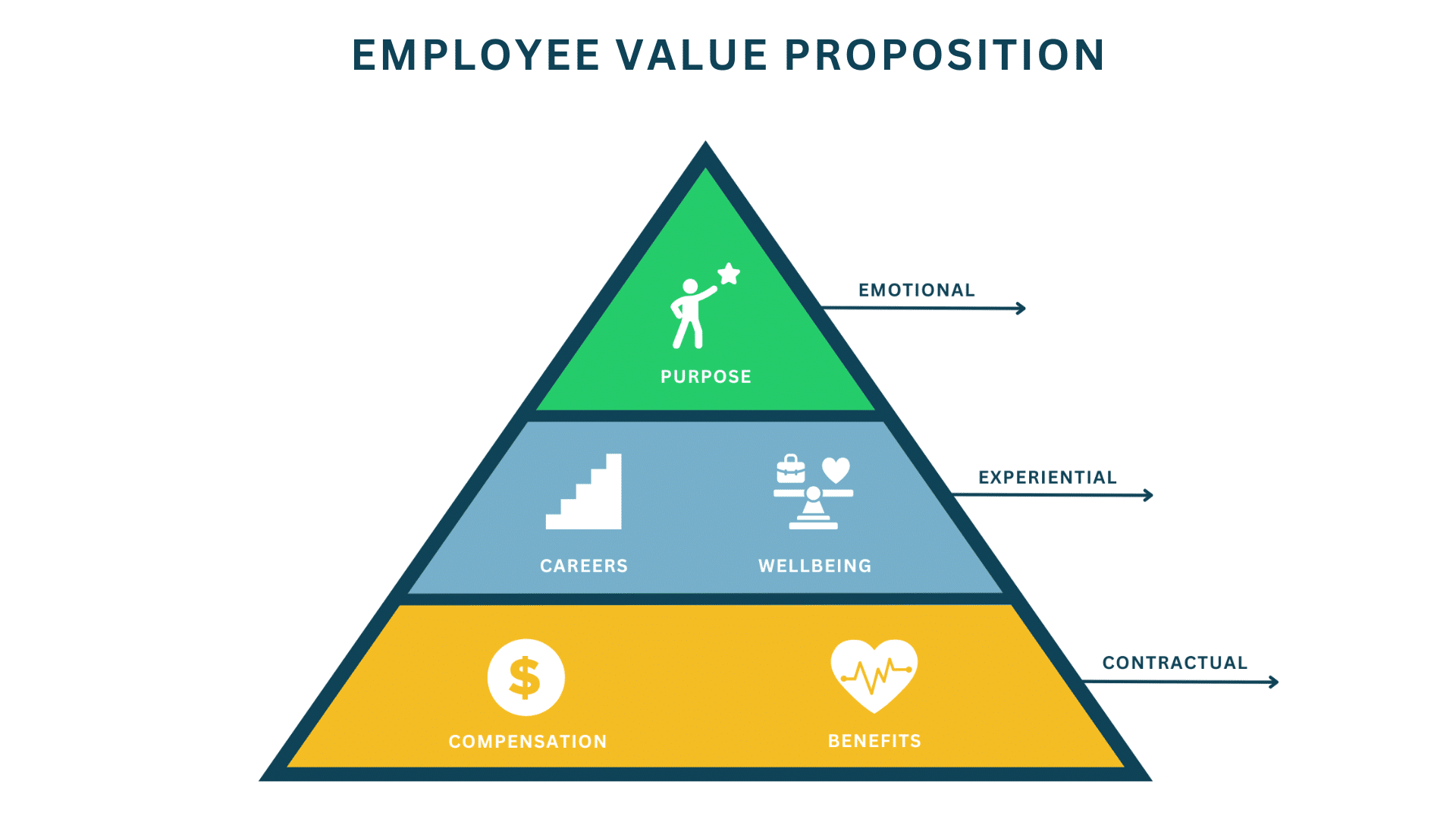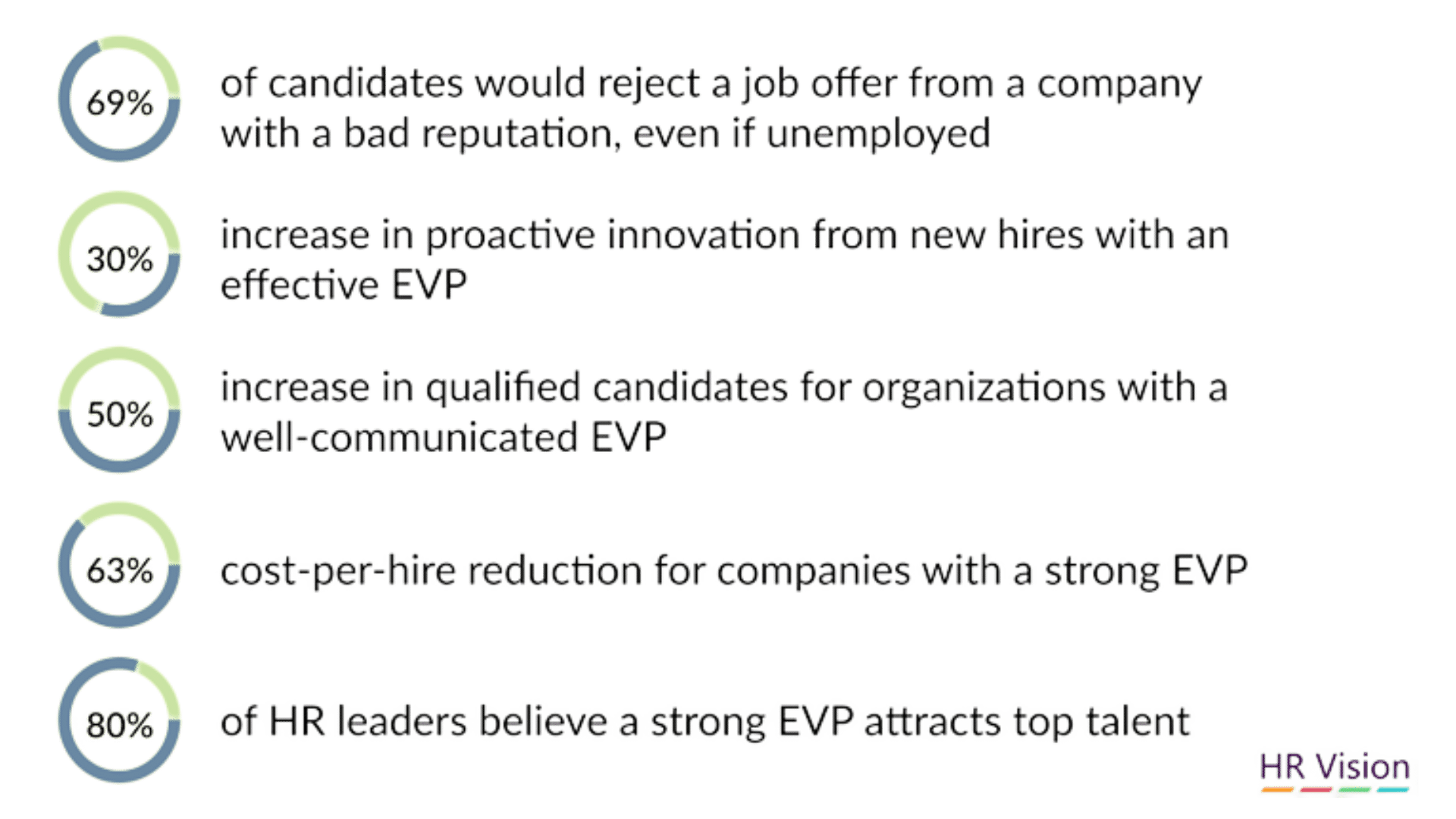Compared to other sectors, the food and beverage industry faces unique challenges when it comes to hiring and retaining talent. Higher turnover rates, rapid innovation, geographical constraints, supply chain complexity, and workforce diversity underscore the importance of a well-crafted EVP to attract talent and engage employees.
What is an Employee Value Proposition?
An Employee Value Proposition (EVP) is the unique set of benefits, rewards, and opportunities that a business offers its employees in exchange for their skills, capabilities, and contributions. Key components of an Employee Value Proposition typically include:
- Compensation and Benefits: Contractual elements such as base salary, bonuses, stock options, health insurance, retirement plans, and other perks.
- Well-being: Differentiated experiential aspects focused on the physical and mental well-being of employees, such as health and wellness programs, flexible work arrangements, and a supportive work environment.
- Career Development: Emphasizes opportunities for professional growth and advancement within the organization. This includes training programs, mentorship, and clear career paths.
- Purpose: Reflects the organization’s mission, values, and broader societal impact. Employees often seek a sense of purpose in their work, and an EVP that aligns with personal values can be a powerful motivator.

The Value of a Compelling EVP
Research by McLean & Company reveals that organizations with a well-defined EVP have employees who are 1.23 times more likely to report a sense of purpose in their work and are:
- 18 times more likely to see higher overall performance
- 16 times more likely to drive innovation; and
- 14 times more likely to experience higher productivity compared to those without an EVP.
According to Gartner®, companies with strong EVPs can reduce the compensation premium by 50 percent and lower turnover rates by 69 percent. Survey results highlight that the modern workforce values more than just salary, they look for workplaces aligned with their values, providing a sense of purpose, and opportunities for continuous learning.

Key Attractions to the Food and Beverage Industry
From thousands of conversations with professionals about positions in the food, beverage, and agribusiness sectors, we’ve found that candidates are drawn to our industry for these primary reasons:
- Stability: Many job seekers see food manufacturing and agriculture as relatively stable industries, as demand for food will always exist. This appeals to those looking for long-term opportunities in a sector that can weather economic fluctuations.
- Meaningful Work: Candidates often express pride in being part of an industry that feeds communities. There’s a sense of fulfillment in knowing their work directly contributes to putting food on tables and sustaining families.
- Passion for Food and Farming: Many candidates feel a personal connection to food and agriculture, whether through their upbringing, lifestyle, or shared values. This passion drives their commitment to careers that align with their interests and values.
By tapping into these motivations and values, companies can craft an EVP that resonates strongly with prospective employees.
Examples of Food, Beverage, and Agribusinesses with strong EVPs:
With over a century of farming heritage and strong partnerships with hundreds of independent growers, Driscoll’s is dedicated to delivering fresh, flavorful, and high-quality berries. Rooted in the values of humility, passion, and trustworthiness, the company’s mission to delight consumers worldwide drives its vision and culture. Driscoll’s fosters a collaborative workplace that prioritizes innovation, sustainability, and meaningful contributions to global food systems while maintaining a strong commitment to work-life balance for its employees.
This EVP appeals to individuals seeking a career where they can make an impact through innovation and collaboration, explore global career paths, and thrive in a company that values its people.
At Great Lakes Cheese, employee ownership and a long-term vision define the company’s culture. Founded over 65 years ago, the company has grown from a neighborhood cheese delivery service to a thriving, family- and employee-owned business. Guided by the values of hard work, honesty, and integrity, Great Lakes Cheese offers a stable, growth-oriented environment where employees take pride in producing quality products. This shared commitment is captured in the company’s vision: “Together, for generations to come.”
This EVP appeals to individuals looking for a meaningful career in food manufacturing, where they can thrive in a collaborative culture and contribute to a legacy of excellence that spans generations.
Elders Limited is one of Australia’s most prominent agribusinesses, with a rich history of supporting rural communities and fostering a thriving workplace culture. Elders is deeply committed to employee engagement, professional development, and community involvement, creating an environment where employees feel valued, supported, and inspired. Programs like “Elders Give It” reflect the company’s dedication to giving back, while initiatives for training and career advancement ensure team members have opportunities to grow and excel.
This EVP appeals to individuals seeking a purpose-driven career in agribusiness, where they can contribute to rural communities, grow professionally, and thrive in a workplace that celebrates collaboration and recognition.
At Tasty Fresh Food Co., collaboration and flexibility drive the company’s culture. With a focus on delivering quality food and supporting communities, the company offers employees opportunities for growth while balancing work-life priorities. Its commitment to making a positive impact through charitable initiatives and exceptional service sets it apart.
This EVP appeals to individuals seeking a dynamic and rewarding workplace where they can contribute to meaningful initiatives while thriving in a supportive environment.
How to Develop an EVP for Food & Agribusiness
The Harvard Business Review article “Rethink Your Employee Value Proposition” by Mark Mortensen and Amy C. Edmondson emphasizes that while material benefits like pay and flexibility are important, they are easily replicable by competitors and have limited long-term impact on employee retention. Creating a compelling EVP requires a data-driven approach tailored to the industry’s unique characteristics and employee needs. Here’s a step-by-step guide to building a strong EVP:
Step 1: Understand Your Workforce
- Gather Insights: Conduct surveys, focus groups, and one-on-one interviews to understand employees’ motivations, concerns, and aspirations. A simple example is a quarterly employee Net Promoter Score (eNPS) to reveal what your employees think about the current state of your company and what improvements can be made.
- Analyze Demographics: Use qualitative and quantitative data to design employee personas that reflect different segments of your workforce. Consider generational preferences, regional differences (e.g., rural vs. urban needs), and workforce diversity.
- Address Specific Needs: Identify key themes that matter most to your employees beyond compensation and benefits, such as professional development, flexibility, job stability, company culture, or community impact. Use employee feedback to identify gaps between current and desired employee experiences.
Step 2: Define What Sets You Apart
- Highlight Industry-Specific Advantages: Everyone needs to eat – highlight the relative stability in the food industry relative to other industries. Showcase opportunities to contribute to sustainable practices and innovative product development. Emphasize roles that impact global food supply chains and community feeding initiatives.
- Leverage Unique Strengths: Emphasize your company’s distinctive traits, such as family-owned values, cutting-edge research, or global reach. Ensure the EVP is realistic and deliverable, avoiding overly aspirational promises.
- Optimize Value Delivery: Invest time, effort, and capital to deliver on your EVP promises. Ensure alignment with broader business strategies like recruitment, retention, and employee engagement.
Step 3: Align EVP with Business Goals
- Reflect Mission and Values: Ensure your EVP reinforces your company’s mission, vision, and core values.
- Hiring and Engagement Strategy: Incorporate the EVP with recruitment, retention, and engagement initiatives to create a cohesive employee experience. Embed the EVP into recruitment marketing to promote your brand, onboarding material to reinforce your culture, and internal communication to keep your employees engaged.
Step 4: Communicate Your EVP
- Share EVP Across Channels: Tailor messaging to different employee segments to ensure authenticity and relevance. Maintain integrity, empathy, personalization, and clear expectations in your EVP delivery.
- Authentic Communication: Avoid generic themes; create a distinctive EVP that speaks directly to priority talent segments. Share stories that reflect your EVP and resonate with your workforce’s experiences and aspirations.
This integrated approach ensures that the EVP is not only compelling but also achievable, with a strong focus on understanding and meeting employee needs, optimizing delivery, and authentic communication.
Conclusion
A compelling EVP is crucial for attracting and retaining top talent, especially for leadership roles in food and agribusiness. Partnering with a search firm that understands your EVP is key to attracting top talent. We ensure your unique strengths are effectively communicated to resonate with the right candidates for leadership roles. Get in touch with a member of our team to learn how we can help you secure the right talent for your company’s goals and vision.

